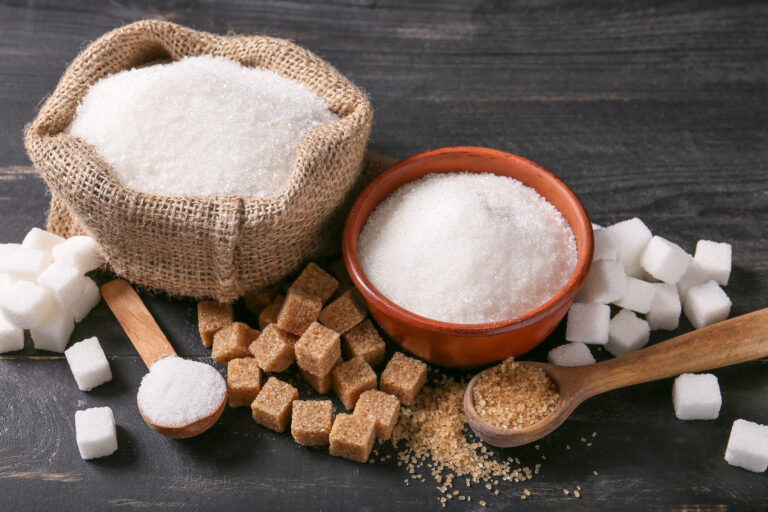April 19 (Punjab Khabarnama) : We all know that too much sugar can be harmful to our health. It is often associated with diabetes or heart disease. But did you know that excess sugar in diet takes a toll on the liver health too?
What happens to the liver when you eat too much sugar?
The human body has biochemical systems that help interchange protein, starch, and fats — it can turn protein into fat or starch. Whatever food we eat, if it is in excess, it gets stored in the form of fat. Now, sugar and other sweets are starch (carbohydrate) and are broken down into glucose by the body A small percentage of this glucose is used for physical exertion, but most of it is converted into fat. In people who do not do physical exercise and lead a sedentary lifestyle, the rate of becoming fat is higher. Excessive consumption of sugar can lead to weight gain and obesity, but can also affect internal organs like the liver. This is how non-alcoholic fatty liver disease is caused.
Surprisingly, you don’t need a diet full of greasy food for fatty liver – too many carbs and sweets, a common issue in India, can be just as detrimental.
Sugar consumption also triggers dopamine release, the “feel-good” hormone. People struggling with stress or depression may crave sweets for this dopamine surge. However, most of this sugary comfort food gets stored as fat, eventually harming the liver. This unhealthy cycle can lead to fatty liver disease, cirrhosis (scarring), and even cancer.
Good bacteria in the intestines are necessary — not only for the smooth functioning of the digestive system but also for your body’s general health. Excessive sweetness in the diet affects the habitat of these gut bacteria (Dysbiosis). This alteration in gut bacteria also causes liver dysmetabolism and damage. Free radicals, which cause liver cancer, are also linked to excessive consumption of sugar.
Can fruits cause fatty liver?
The sugar molecule in fruits exist in the form of fructose. The amount is different for each fruit, higher in succulent fruits like grapes, oranges, watermelon etc; lower in fleshy fruits like guava, apple, kiwi.
Though fruits are generally considered to be good for health, but their excessive consumption transforms fructose to fat in the liver, causing fatty liver.
The hidden sweetness in packaged foods
Apart from sweets, candies, pastries which are sold in the market, packaged foods though considered not to have sugar also contain covertly added sugar in it.
Below are the examples:
- Ketchup
- Yogurt
- Cereal
- Oats
- Malt drinks for children (Boost, Bourvita, Horlicks)
- Peanut Butter
- Bread( sold as “milk bread”, “Fruit bread”)
- Biscuit
Why is sugar tax important?
The UK was the first country in the world to introduce a sugar tax in 2016. The sugar tax was introduced in view of the health problems caused by the overabundance of sugar in packaged food items. Since 2016, the food industry in England has made significant changes in the way packaged food is produced; with the amount of covert sugar additives coming down!
There is a secret interest behind the addition of sugar, even in the most unexpected of children’s food like cereal. It is a marketing strategy that makes children addicted to sweets at an early age. Recently, the Ministry of Commerce and Industry had recommended removing Bournvita from the category of health drinks on the grounds that it is not a health drink since it has sugar content beyond permissible limit.
Other than staying away from sugar, here are 10 things you can do for a healthy liver:
- Do regular exercises and lead an active lifestyle: Regular aerobic exercise is the key for fatty liver disease prevention.
- Limit your alcohol intake. Especially those with metabolic syndromes like diabetes, hypertension, high cholesterol as both of these together can enhance liver damage.
- Eat a balanced diet: Eat less fatty foods and more fibre. The diet should include low carbohydrate, high dietary fibre. Sweets and red meat to be avoided.
- Watch your body weight: Liver disease risk is much less if you maintain an ideal BMI.
- Avoid herbal supplements and traditional remedies, especially those which do not have a drug licence, as most of these are sold as “food supplements”.
- Get vaccinated against Hepatitis B
- Practice safe sex. Blood and body fluid borne viruses HBV and HCV can cause liver cirrhosis and liver cancer.
- Screening for liver disease from the age of 40.
- Keep away from weight loss pills and unscientific magic remedies propagated in social media.



